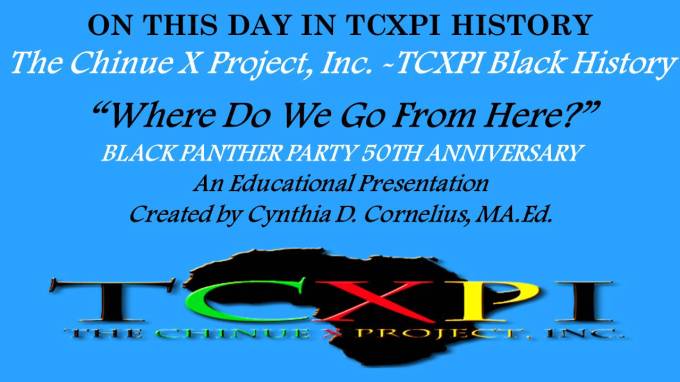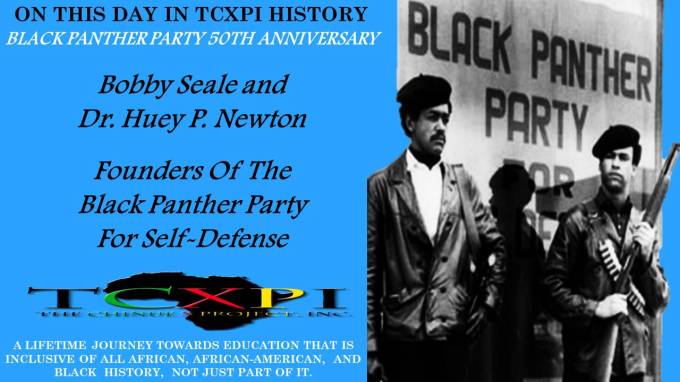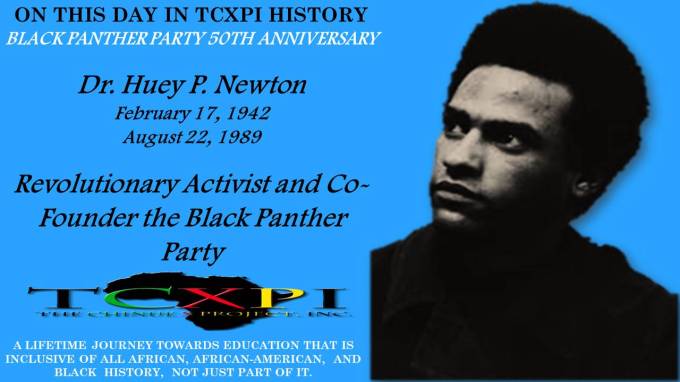Dick Gregory, comedian, actor, and civil rights activist, was born Richard Claxton Gregory in 1932 in St. Louis, Missouri. Gregory's father left the family when Gregory was a child forcing his mother, Lucille, a maid, to raise him and his five siblings. During his high school years Gregory joined the track team at Sumner High School and broke several school records. He consequently won a track scholarship to Southern Illinois University in 1951.
Around 1953, Gregory’s mother died and he left college. He was drafted into the Army, where he performed as a comedian and won his first talent show. Three years after leaving the Army, Gregory made his name as a comedian in Chicago nightclubs while living with his brother Presley. In 1959, he married Lillian Smith and together they had ten children.
In 1960, Gregory accepted Hugh Hefner’s invitation to perform for a group of white Southerners at Chicago’s Playboy Lounge. The gig turned into a six-week commitment and he received positive reviews in national publications such as Time magazine. The job helped Gregory become one of the first black comedians to successfully perform in major all-white nightclubs. Through programs such as the Jack Paar Show, he became one of the first black comedians to break through to national white television audiences. His humor often addressed the contemporary issues of segregation and racism which were being brought to the national spotlight by the civil rights movement. During this time Gregory increasingly devoted his humor to the civil rights cause. Between 1961 and 1964 he released In Living Black and White, Dick Gregory Talks Turkey, The Two Sides of Dick Gregory, and Running for President.
In the early 1960s, Gregory befriended Civil Rights activist Medgar Evers and went to Mississippi to march for black voting rights. After Evers’ 1963 murder, Gregory gave up performing full-time to become more involved in the Civil Rights movement. He marched with Dr. Martin Luther King Jr. and other civil rights leaders. He flew to Moscow, USSR to protest Soviet treatment of black soldiers in 1964. In 1967, Gregory ran for mayor in Chicago, but lost to Richard J. Daley. He then organized a failed bid for the presidency in 1968.
In the early 1970s, Gregory expanded his focus to world hunger and healthy nutrition. He moved his family to Plymouth, Massachusetts where he became a vegetarian and started running marathons. Gregory also fasted to draw attention to national and international causes such as racial injustice, the war in Vietnam, world hunger, the treatment of Native Americans, and apartheid.
Over the next three decades, Gregory became a popular speaker on civil and human rights at universities and colleges. He hosted his own Washington D.C. radio show and wrote several books, including Nigger, Up From Nigger, No More Lies, and Callus on My Soul. He also developed and sold a diet drink. Late in life, he still performed comedy at St. Louis and New York clubs. His latest work is Dick Gregory 21st Century “State of the Union.”
Dick Gregory died of heart failure in Washington, D.C. on August 19, 2017. He was 84.
Source: BlackPast.org
AFROCENTRICITY, Its Value, Importance, and Necessity in the Liberation, Education and Transformation of people of African descent globally. It is imperative for the well being of the Black race. TCXPI is an African-Centered Online Educational Resource Service, and Personal Transformative Vehicle that seeks to Reclaim and Affirm African Heritage and Consciousness. It is nurtured through transformation, dedication, and commitment to the AFRICAN-CENTERED Self. "Know Thy Self" Imhotep
Followers
Thursday, September 14, 2017
Rest In Peace Mr. Dick Gregory
Posted by
The Chinue X Project, Inc, An Afrocentric Educational Resource Service TCXPI AERS
at
5:58 PM
0
comments

Tuesday, August 15, 2017
TCXPI Present Afrocentric Education and Its Importance: A Comprehensive Analysis
TCXPI Present Afrocentric Education and Its Importance: A Comprehensive Analysis
This comprehensive analysis examines the value and viability of Afrocentricity, Afrocentric and/or African Centered Education as alternatives to Eurocentric education, and critically analyzes the theoretical frameworks of Afrocentricity as pedagogy for children and youth.
It will seek to answer the following questions;
1.) Does Afrocentricity in children and youth shape their identity? 2.) Does Afrocentricity in children and youth shape their academic achievement?
3.)Does Afrocentricity in children and youth shape their development?
To purchase, please visit the CreateSpace eStore: https://www.createspace.com/7304149
Posted by
The Chinue X Project, Inc, An Afrocentric Educational Resource Service TCXPI AERS
at
8:46 PM
0
comments

Tuesday, July 25, 2017
TCXPI First Annual Young Scholar BackPack Give-Away Fundraiser, Oakland, CA
PLEASE DONATE TODAY!
JUST A $5.00 DONATION IS ALL IT TAKES!
TCXPI First Annual Young Scholar BackPack Give-Away Fundraiser, Oakland, CA has begun.
GOAL: To assemble 20 backpacks filled with school supplies for give-away children K-5 in the Oakland, CA community.
If each person gives JUST $5.00, it will support our cause tremendously.
Please donate today!
CLICK Any of these links: Facebook Fundraiser, TCXPI Educational Fund 2017, PayPal
Help A Child Have A Fully Supplied BackPack!
#tcxpi
Posted by
The Chinue X Project, Inc, An Afrocentric Educational Resource Service TCXPI AERS
at
1:07 PM
0
comments

Sunday, March 19, 2017
Rest In Peace Chuck Berry
On This Day In TCXPI History
Rest in Peace,
Chuck Berry, The Founding Father Of Rock n Roll.
Guitarist, singer, and songwriter Charles Edward Anderson “Chuck” Berry is considered a pioneer of rock and roll and a major influence on 20th century popular music. His songs such as “Johnny B. Goode” and “Roll Over Beethoven” are rock and roll standards.
Chuck Berry was born in St. Louis, Missouri on October 18, 1926 to a middle class family which included six siblings. His father Henry worked in a flour mill and his mother Martha was a college graduate. Chuck’s mother played piano and both she and his father were church singers instilling in their son an early interest in music.
Despite his middle class family background, Berry as a teenager joined two high school friends in committing a short string of armed robberies in Kansas City, Missouri. They were arrested and Berry was convicted and served three years in prison between 1944 and 1947.
Shortly after he was released Berry married Themetta Suggs. The couple had two children and Berry settled into family life while working at an automobile assembly plant in St. Louis and taking jobs as a carpenter with his father. In his free time Berry finally pursued an early fascination with guitar, taking lessons from Ira Harris, a local jazz guitarist.
By 1952 Berry was playing professional engagements in St. Louis clubs and eventually joined the St. John’s Trio, led by pianist Johnnie Johnson and including drummer Eddy Hardy. Berry incorporated elements of country into the trio’s sound but he also brought in blues songs, turning the trio into a prototype rock and roll band.
In 1955 Berry traveled to Chicago where he had a chance meeting with Muddy Waters and asked him for advice about getting to record. Waters sent him to see Leonard Chess at Chess Records who listened to Berry’s home recording of “Ida Mae,” a popular country tune. Chess immediately offered a recording session and on May 21, 1955 Chuck Berry recorded “Ida Mae” with reworked lyrics and a new title, “Maybelline.” Berry’s first recording, “Maybelline,” reached #1 on the Billboard R&B chart and sold over one million copies. By the late 1950s Berry was an established star with several hit records, film appearances, and a profitable touring schedule. In 1962, however, his career was derailed when Berry was convicted of violating the Mann Act for allegedly transporting an underage girl across state lines for immoral purposes, a charge that Berry still disputes.
After his release in 1963 Berry had a string of hits though none reached the popularity of his earlier recordings. By the 1970s he was primarily in demand for rock and roll revival shows where he played his past hits. In 1972 his live recording of the novelty pop song “My Ding-A-Ling” became his only #1 single on the U.S. pop charts. He continued touring but in 1979 his insistence in being paid in cash led to a third jail sentence of four months for tax evasion.
In 1986 Berry became one of the first musicians to be inducted into The Rock and Roll Hall of Fame. He is also listed as 5th in Rolling Stone magazine’s 2004 list of The Greatest Artists of All Time and 7th on the list of Rolling Stone’s 100 Greatest Guitarists. Now in his late 80s, Chuck Berry continues to play occasional concerts around the globe.
Source:
BlackPast.org
http://www.blackpast.org/aah/berry-charles-edward-anderson-chuck-1926
(Accessed on 03/17/2017)
For more TCXPI, visit:
http://tcxpi.org/
http://www.tcxpissp.com/
https://www.facebook.com/TCXPIHistory https://www.facebook.com/TCXPI?ref=hl
https://www.facebook.com/TheMediaAndTheBlackCommunityTcxpi?ref=hl
#tcxpi
#otd
#DailyBlackHistoryFacts
#OnThisDayInTCXPIHistory
Chuck Berry, The Founding Father Of Rock n Roll.
Guitarist, singer, and songwriter Charles Edward Anderson “Chuck” Berry is considered a pioneer of rock and roll and a major influence on 20th century popular music. His songs such as “Johnny B. Goode” and “Roll Over Beethoven” are rock and roll standards.
Chuck Berry was born in St. Louis, Missouri on October 18, 1926 to a middle class family which included six siblings. His father Henry worked in a flour mill and his mother Martha was a college graduate. Chuck’s mother played piano and both she and his father were church singers instilling in their son an early interest in music.
Despite his middle class family background, Berry as a teenager joined two high school friends in committing a short string of armed robberies in Kansas City, Missouri. They were arrested and Berry was convicted and served three years in prison between 1944 and 1947.
Shortly after he was released Berry married Themetta Suggs. The couple had two children and Berry settled into family life while working at an automobile assembly plant in St. Louis and taking jobs as a carpenter with his father. In his free time Berry finally pursued an early fascination with guitar, taking lessons from Ira Harris, a local jazz guitarist.
By 1952 Berry was playing professional engagements in St. Louis clubs and eventually joined the St. John’s Trio, led by pianist Johnnie Johnson and including drummer Eddy Hardy. Berry incorporated elements of country into the trio’s sound but he also brought in blues songs, turning the trio into a prototype rock and roll band.
In 1955 Berry traveled to Chicago where he had a chance meeting with Muddy Waters and asked him for advice about getting to record. Waters sent him to see Leonard Chess at Chess Records who listened to Berry’s home recording of “Ida Mae,” a popular country tune. Chess immediately offered a recording session and on May 21, 1955 Chuck Berry recorded “Ida Mae” with reworked lyrics and a new title, “Maybelline.” Berry’s first recording, “Maybelline,” reached #1 on the Billboard R&B chart and sold over one million copies. By the late 1950s Berry was an established star with several hit records, film appearances, and a profitable touring schedule. In 1962, however, his career was derailed when Berry was convicted of violating the Mann Act for allegedly transporting an underage girl across state lines for immoral purposes, a charge that Berry still disputes.
After his release in 1963 Berry had a string of hits though none reached the popularity of his earlier recordings. By the 1970s he was primarily in demand for rock and roll revival shows where he played his past hits. In 1972 his live recording of the novelty pop song “My Ding-A-Ling” became his only #1 single on the U.S. pop charts. He continued touring but in 1979 his insistence in being paid in cash led to a third jail sentence of four months for tax evasion.
In 1986 Berry became one of the first musicians to be inducted into The Rock and Roll Hall of Fame. He is also listed as 5th in Rolling Stone magazine’s 2004 list of The Greatest Artists of All Time and 7th on the list of Rolling Stone’s 100 Greatest Guitarists. Now in his late 80s, Chuck Berry continues to play occasional concerts around the globe.
Source:
BlackPast.org
http://www.blackpast.org/aah/berry-charles-edward-anderson-chuck-1926
(Accessed on 03/17/2017)
For more TCXPI, visit:
http://tcxpi.org/
http://www.tcxpissp.com/
https://www.facebook.com/TCXPIHistory https://www.facebook.com/TCXPI?ref=hl
https://www.facebook.com/TheMediaAndTheBlackCommunityTcxpi?ref=hl
#tcxpi
#otd
#DailyBlackHistoryFacts
#OnThisDayInTCXPIHistory
Posted by
The Chinue X Project, Inc, An Afrocentric Educational Resource Service TCXPI AERS
at
8:58 PM
0
comments

Wednesday, October 19, 2016
The Black Panther Party In Images
Posted by
The Chinue X Project, Inc, An Afrocentric Educational Resource Service TCXPI AERS
at
7:27 AM
0
comments

Sunday, October 16, 2016
TCXPI Presents The Black Panther Party 50th Anniversary
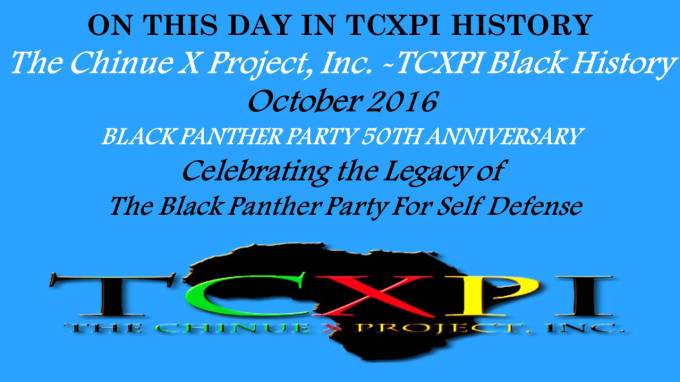
TCXPI is an online Afrocentric Educational Resource Service established in Maryland as a non-profit. It seeks to bring awareness to the many contributions made by African and Black Americans in World and Human Civilization.
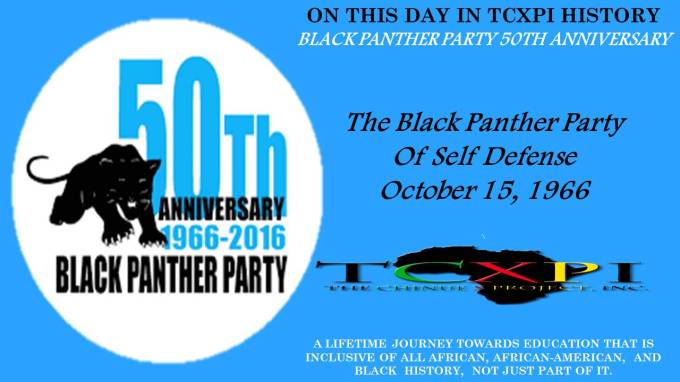
There was no specific event that launched the Black Panther Party, but the generally agreed-upon date is Oct. 15, 1966. The one person who does not agree on that date is Seale, who was reached by phone Friday, as his plane landed after a speech at the University of Oregon. Seale said the founding date was Oct. 22, 1966, which was his 30th birthday and the day he and the late Huey Newton finished the “10 Point Platform and Program” for the Black Panther Party for Self Defense (as it was originally called).
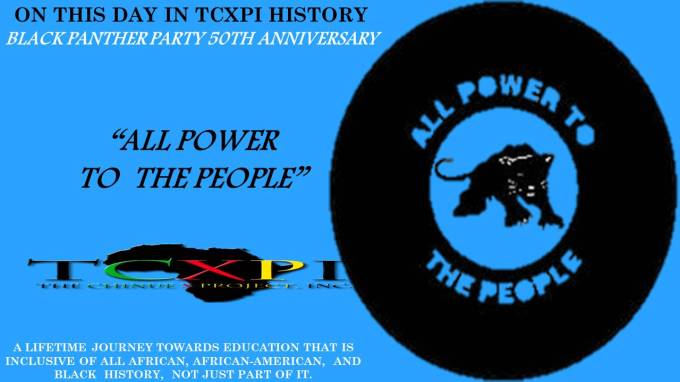
The Black Panther Party was the most famous group born out of the Black Power Movement. Because of the group's inherent link to the Black Power Movement, and the group's slogan of "Black Power," many people, both black and white, believed, and continue to believe, that the Black Panther Party was a group with racial motives. However, this conceptualization of the Party was, and is, incorrect. While the Black Panther Party began as an outgrowth of the black civil rights movement, the Panthers quickly evolved into a revolutionary vanguard with a non-racial, class-oriented agenda. Read more at: http://fau.digital.flvc.org/islandora/object/fau%3A1476
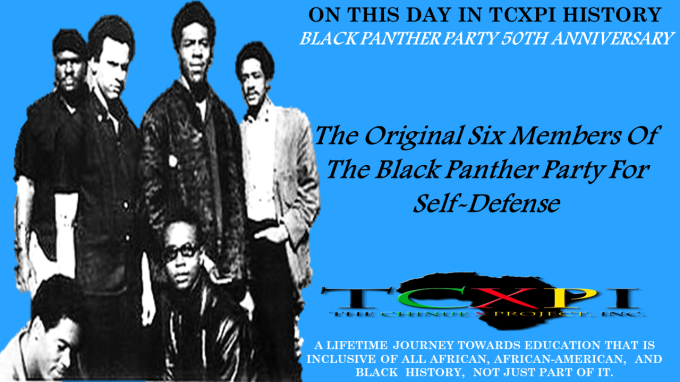
- Enter a caption
TCXPI (The Chinue X Project, Inc.) Presents
October Is Black Panther Party Month! October 3
The Black Panther Party For Self-Defense originated in Oakland, California, by founders Huey Newton and Bobby Seale. The Original six members of the Black Panthers included Elbert “Big Man” Howard, Sherman Forte, Reggie Forte, Little Bobby Hutton, and Newton and Seale. They adopted the Black Panther symbol from an independent political party established the previous year by Black residents of Lowndes County, Alabama. The Panthers also supported the Black Power movement, which stressed racial dignity and self-reliance.
The Party established patrols in Black communities to monitor police activities and protect the residents from police brutality. The Black Panther Party combined elements of socialism and Black Nationalism. It promoted the development of strong Black-controlled institutions, calling for Blacks to work together to protect their rights and to improve their economic and social conditions.
The Panthers also emphasized class unity, criticizing the Black middle class for acting against the interests of other, less fortunate Blacks.
First Original Six Members of the Black Panther Party; Huey Newton, Bobby Seale, Bobby Hutton, Sherwin Forte, Elbert Howard, Reggie Forte
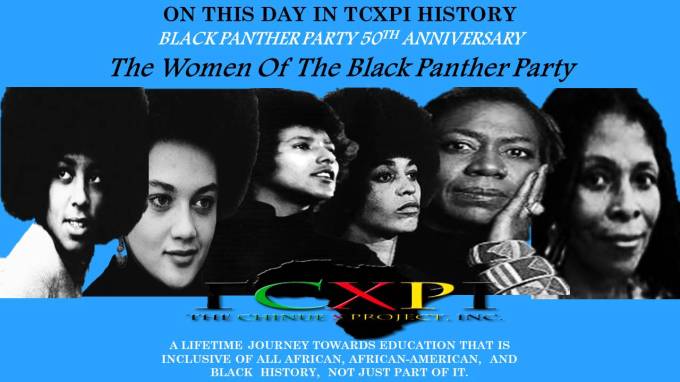
- Enter a caption
On This Day In TCXPI History
(The Chinue X Project, Inc.) TCXPI Presents The Black Panther Party 50th Anniversary
October Is Black Panther Party Month! October 4
The Women Of The Black Panther Party
(From left to right-) Tarika Mutilaba, Kathleen Cleaver, Elaine Brown, Angela Davis, Afeni Shakur, Assata Shakur.
On This Day In TCXPI History
(The Chinue X Project, Inc.) TCXPI Presents The Black Panther Party 50th Anniversary
(The Chinue X Project, Inc.) TCXPI Presents The Black Panther Party 50th Anniversary
October Is Black Panther Party Month! October 5
In 1966, while at Oakland City College, Huey P. Newton and Bobby Seale organized the Black Panther Party For Self-Defense.
Seale became Chairman while Newton became Minister of Defense.
The Panthers practiced militant self-defense of minority communities against the U.S. government, and fought to establish revolutionary socialism through mass organizing and community based programs. The party was one of the first organizations in U.S. history to militantly struggle for ethnic minority and working class emancipation — a party whose agenda was the revolutionary establishment of real economic, social, and political equality across gender and color lines.
Sources:
https://www.marxists.org/history/usa/workers/black-panthers/
https://ia802701.us.archive.org/26/items/SeizeTheTimeTheStoryOfTheBlackPantherParty/STT.pdf
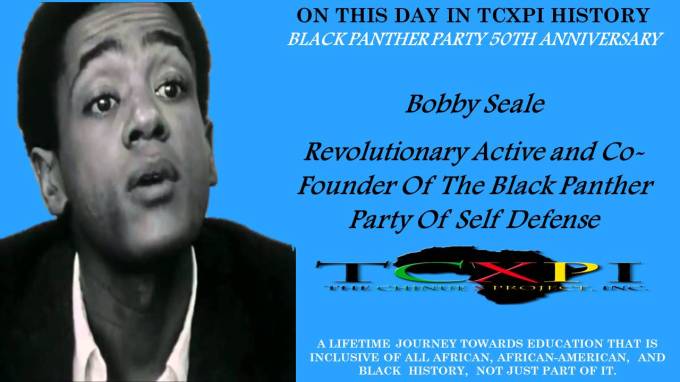
https://www.marxists.org/history/usa/workers/black-panthers/
https://ia802701.us.archive.org/26/items/SeizeTheTimeTheStoryOfTheBlackPantherParty/STT.pdf

On This Day In TCXPI History
(The Chinue X Project, Inc.) TCXPI Presents The Black Panther Party 50th Anniversary
October Is Black Panther Party Month! October 6
Robert George Seale was born on October 22, 1936, to George and Thelma Seale. His father was a master carpenter, and his mother was a home maker. The oldest of three children, Seale grew up with his younger brother Jon, his sister Betty, and his cousin Alvin Turner.
Note - These pictures are assumed to be in the public domain, if this is not the case, please let us know by emailing us at thecxpi@gmail.com so that we can give credit or remove them from the web site as desired.
On This Day In TCXPI History
(The Chinue X Project, Inc.) TCXPI Presents The Black Panther Party 50th Anniversary
(The Chinue X Project, Inc.) TCXPI Presents The Black Panther Party 50th Anniversary
October Is Black Panther Party Month! October 7
Huey P. Newton Revolutionary Activist and Co-Founder the Black Panther Party
QUOTES
“The first lesson a revolutionary must learn is that he is a doomed man.”
—Huey P. Newton
QUOTES
“The first lesson a revolutionary must learn is that he is a doomed man.”
—Huey P. Newton
Huey P. Newton was born in Monroe, Louisiana, on February 17, 1942, and named after former governor Huey P. Long. In 1966, Newton and Bobby Seale founded the left-wing Black Panther Party for Self Defense in Oakland, California. The organization was central to the Black Power movement, making headlines with its controversial rhetoric and militaristic style. Newton faced a number of criminal charges over the years and at one point fled to Cuba before returning to the U.S. and earning his doctorate. Struggling with drug and alcohol addiction in his later years, he was killed in 1989 in Oakland.
Social activist Huey Percy Newton was born on February 17, 1942, in Monroe, Louisiana. Newton helped establish the African-American political organization the Black Panther Party, and became a leading figure in the Black Power movement of the 1960s. The youngest of seven siblings, he and his family moved to Oakland, California when Newton was a toddler. Though later stating he was close to his family, the youngster had a difficult time early in life, which was reflected in highly erratic behavior at school and on the streets.
Note - These pictures are assumed to be in the public domain, if this is not the case, please let us know by emailing us at thecxpi@gmail.com so that we can give credit or remove them from the web site as desired.
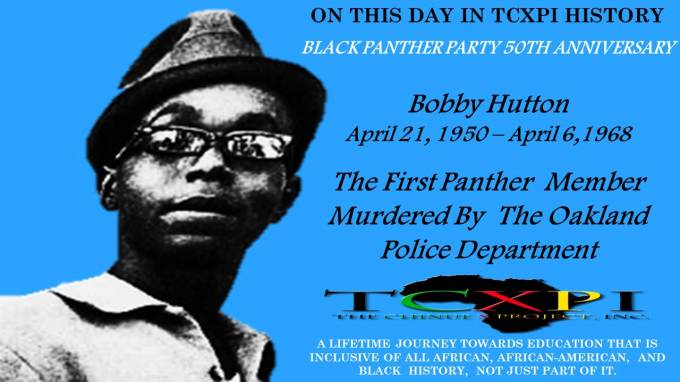
On This Day In TCXPI History
(The Chinue X Project, Inc.) TCXPI Presents The Black Panther Party 50th Anniversary
October Is Black Panther Party Month! October 8
BOBBY HUTTON - The Day My Beloved Brother Comrade was Murdered
On April 6, 1968, two days after Martin Luther King had been murdered, I got dressed and prepared to go to Central Headquarters of the Black Panther Party (BPP) along with Panthers Jimmy Charley and Terry Claridy. I read a chapter of the "Red Book - Quotations by Chairman Mao" before I left. We arrived at Central Headquarters at 45th and Grove St. to get assigned to various locations to sell the Party's newspaper "The Black Panther," collect donations and pass out leaflets in the community about the barbecue for the "Free Huey Newton" defense committee to be held at then called - Defremery Park on April 7th.
Later that evening, around 4pm, other Panthers and I, in groups of two and three, were circulating in the community and going to high schools spreading the word that despite the murder of Dr. King, they should stay cool, lay low and refrain from all counterproductive and random violence, because riots would cause nothing but mass genocide. If trouble erupted, it would be open season on blacks and the BPP would be the first attacked.
Around 6pm, some Party members and I met at a Panther's apartment off San Pablo Ave. We decided that we would ride in three vehicles transporting food and supplies for the barbecue picnic and at the same time we would observe and patrol the police activities in the Black community.
Around 7:30pm, after patrolling and picking up supplies for the rally, two policemen turned their cruiser south observing and following us onto 28th street and Union street where we had stopped for a minute for Eldridge Cleaver who had to urinate. Eldridge and L'il Bobby Hutton were riding in a 1961 Ford with several other Panthers. I was riding shotgun, in the center of the back seat, armed with a banana clip 30 caliber carbine. Panther Charles Bursey was to the left of me and Donnell Lankford was to the right. The officers pulled their cruiser to a stop in the middle of the street side by side with these vehicles. (The 1961 Ford with Florida license plates had been observed all week because it was known by the Oakland Police as a Panther vehicle.) Gunfire erupted at once, two wild shots were followed instantly by a deluge of lead that riddled the squad cars and shots were fired by police into the rear window of the 1954 Ford in which I was riding.
More policemen flocked to the shooting scene. Charles Bursey was able to get out of the car and escape the scene. Donnell Lankford, who was to the right of me, attempted to open the door so we could take cover, but the door was jammed. The door finally came open, but as soon as we tried to exit the vehicle, there were about a dozen police with their guns and shotguns drawn and thrust into our faces. They were making racist, insulting remarks while we were lying face down, handcuffed behind our backs, helpless on the pavement. They made statements such as, "you niggers just lost Martin Luther King and if you make one move we will not hesitate to blow your heads off."
We were then put into the police paddy wagon. Donnell, John L. Scott and I were the first to be arrested. The over- reactionary pigs sprayed mace into our eyes after we were already handcuffed and helpless. As the police wagon drove away from the scene, I could barely see out the back, but it appeared to me that there were black people running behind the wagon saying, "Free these brothers, you racist cops." I told my comrades in the police wagon that this was a deliberate ambush, attempting to commit genocide against the BPP.
The booking officer asked me if I wanted to make a statement after being booked. I said no, I was taking the 5th amendment until I consulted with my attorney, Charles Garry. They put Lankford, Scott and me into different holding cells. I could hear racist statements like, "They should kill Eldridge Cleaver. He's like a wild animal running amok." Note: the ambush of other Party members was still going on at this time. Later that night, Harold Rodgers, Charles Garry's assistant attorney, visited me in my cell and told me that one Party member did not survive. That was the Party's first member and treasurer, Bobby James Hutton.
Long Live the Spirit of Lil Bobby Hutton.
Terry M. Cotton, former political prisoner and BPP member
Note - These pictures are assumed to be in the public domain, if this is not the case, please let us know by emailing us at thecxpi@gmail.com so that we can give credit or remove them from the web site as desired.
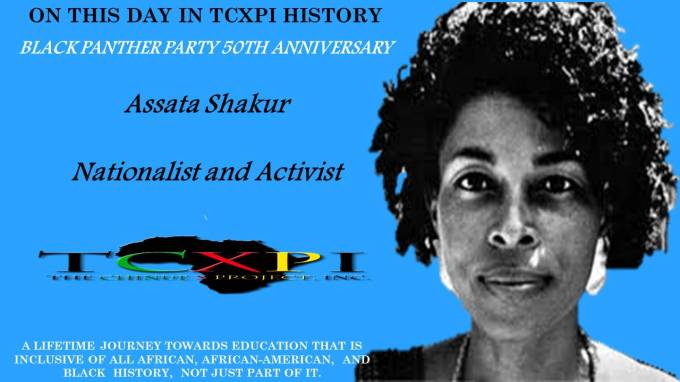
On This Day In TCXPI History
October Is Black Panther Party Month! October 9
Born in Queens, New York, Joanne Deborah Bryon, a Nationalist and Activist, spent her early childhood alternately with her grandparents in Wilmington, North Carolina, and with her mother in New York. She dropped out of high school at seventeen but returned to college during her early twenties, attending Manhattan Community College and City College of New York. She was married for a year while in school and continued to use her married name.
She became a student activist and participated in rent strikes, antiwar demonstrations, and sitins, protesting racial injustices. As a reflection of her new political consciousness and her commitment to her African heritage, she changed her name to Assata ("she who struggles") Shakur ("the thankful"). The assassination of the Rev. Dr. Martin Luther King Jr. in 1968 precipitated Assata Shakur's embrace of the militant Black Power movement and her rejection of nonviolence.
Assata Shakur moved to Oakland, California, where she joined the Black Panther Party (BPP) in Oakland and helped organize community education programs, demonstrations, and political rallies. When she returned to New York, she became a key member of the BPP's Harlem chapter. She helped organize and staff the Free Breakfast Program for community children, oversaw the planning of a free clinic, and coordinated member health care, first aid, and community outreach.
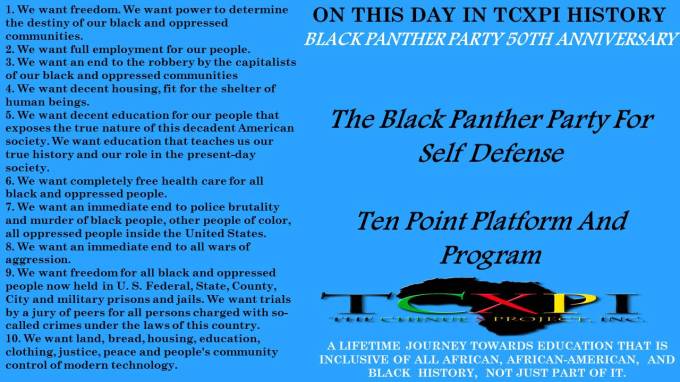
On This Day In TCXPI History
(The Chinue X Project, Inc.) TCXPI Presents The Black Panther Party 50th Anniversary
October Is Black Panther Party Month! October 10
The Black Panthers: Ten Point Platform and Program
- WE WANT FREEDOM. WE WANT POWER TO DETERMINE THE DESTINY OF OUR BLACK AND OPPRESSED COMMUNITIES. We believe that Black and oppressed people will not be free until we are able to determine our destinies in our own communities ourselves, by fully controlling all the institutions which exist in our communities.
- WE WANT FULL EMPLOYMENT FOR OUR PEOPLE. We believe that the federal government is responsible and obligated to give every person employment or a guaranteed income. We believe that if the American businessmen will not give full employment, then the technology and means of production should be taken from the businessmen and placed in the community so that the people of the community can organize and employ all of its people and give a high standard of living.
- WE WANT AN END TO THE ROBBERY BY THE CAPITALISTS OF OUR BLACK AND OPPRESSED COMMUNITIES. We believe that this racist government has robbed us and now we are demanding the overdue debt of forty acres and two mules. Forty acres and two mules were promised 100 years ago as restitution for slave labor and mass murder of Black people. We will accept the payment in currency which will be distributed to our many communities. The American racist has taken part in the slaughter of our fifty million Black people. Therefore, we feel this is a modest demand that we make.
- WE WANT DECENT HOUSING, FIT FOR THE SHELTER OF HUMAN BEINGS. We believe that if the landlords will not give decent housing to our Black and oppressed communities, then housing and the land should be made into cooperatives so that the people in our communities, with government aid, can build and make decent housing for the people.
- WE WANT DECENT EDUCATION FOR OUR PEOPLE THAT EXPOSES THE TRUE NATURE OF THIS DECADENT AMERICAN SOCIETY. WE WANT EDUCATION THAT TEACHES US OUR TRUE HISTORY AND OUR ROLE IN THE PRESENT-DAY SOCIETY. We believe in an educational system that will give to our people a knowledge of the self. If you do not have knowledge of yourself and your position in the society and in the world, then you will have little chance to know anything else.
- WE WANT COMPLETELY FREE HEALTH CARE FOR ALL BLACK AND OPPRESSED PEOPLE. We believe that the government must provide, free of charge, for the people, health facilities which will not only treat our illnesses, most of which have come about as a result of our oppression, but which will also develop preventive medical programs to guarantee our future survival. We believe that mass health education and research programs must be developed to give all Black and oppressed people access to advanced scientific and medical information, so we may provide our selves with proper medical attention and care.
- WE WANT AN IMMEDIATE END TO POLICE BRUTALITY AND MURDER OF BLACK PEOPLE, OTHER PEOPLE OF COLOR, ALL OPPRESSED PEOPLE INSIDE THE UNITED STATES. We believe that the racist and fascist government of the United States uses its domestic enforcement agencies to carry out its program of oppression against black people, other people of color and poor people inside the united States. We believe it is our right, therefore, to defend ourselves against such armed forces and that all Black and oppressed people should be armed for self defense of our homes and communities against these fascist police forces.
- WE WANT AN IMMEDIATE END TO ALL WARS OF AGGRESSION. We believe that the various conflicts which exist around the world stem directly from the aggressive desire of the United States ruling circle and government to force its domination upon the oppressed people of the world. We believe that if the United States government or its lackeys do not cease these aggressive wars it is the right of the people to defend themselves by any means necessary against their aggressors.
- WE WANT FREEDOM FOR ALL BLACK AND OPPRESSED PEOPLE NOW HELD IN U. S. FEDERAL, STATE, COUNTY, CITY AND MILITARY PRISONS AND JAILS. WE WANT TRIALS BY A JURY OF PEERS FOR All PERSONS CHARGED WITH SO-CALLED CRIMES UNDER THE LAWS OF THIS COUNTRY. We believe that the many Black and poor oppressed people now held in United States prisons and jails have not received fair and impartial trials under a racist and fascist judicial system and should be free from incarceration. We believe in the ultimate elimination of all wretched, inhuman penal institutions, because the masses of men and women imprisoned inside the United States or by the United States military are the victims of oppressive conditions which are the real cause of their imprisonment. We believe that when persons are brought to trial they must be guaranteed, by the United States, juries of their peers, attorneys of their choice and freedom from imprisonment while awaiting trial.
- WE WANT LAND, BREAD, HOUSING, EDUCATION, CLOTHING, JUSTICE, PEACE AND PEOPLE'S COMMUNITY CONTROL OF MODERN TECHNOLOGY. When, in the course of human events, it becomes necessary for one people to dissolve the political bonds which have connected them with another, and to assume, among the powers of the earth, the separate and equal station to which the laws of nature and nature's God entitle them, a decent respect to the opinions of mankind requires that they should declare the causes which impel them to the separation. We hold these truths to be self-evident, that all men are created equal; that they are endowed by their Creator with certain unalienable rights; that among these are life, liberty, and the pursuit of happiness. That to secure these rights, governments are instituted among men, deriving their just powers from the consent of the governed; that, whenever any form of government becomes destructive of these ends, it is the right of the people to alter or to abolish it, and to institute a new government, laying its foundation on such principles, and organizing its powers in such form as to them shall seem most likely to effect their safety and happiness. Prudence, indeed, will dictate that governments long established should not be changed for light and transient causes; and, accordingly, all experience hath shown that mankind are most disposed to suffer, while evils are sufferable, than to right themselves by abolishing the forms to which they are accustomed. But, when a long train of abuses and usurpation, pursuing invariably the same object, evinces a design to reduce them under absolute despotism, it is their right, it is their duty, to throw off such government, and to provide new guards for their future security.
Source: https://www.linkedin.com/pulse/ten-point-platform-program-formation-black-panther-party-bobby-seale
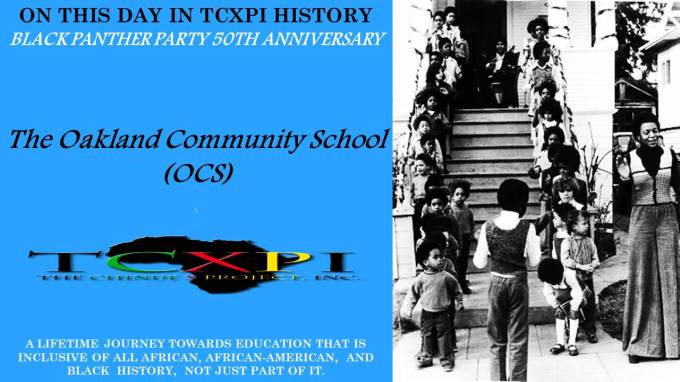
On This Day In TCXPI History
October Is Black Panther Party Month! October 11
The Oakland Community School (OCS)
Historically, the educational programs of the BPP started long before the OCS with the vision of the party’s leaders.
As early as 1967 Huey Newton and Bobby Seale began speaking to high school youth at San Francisco/Bay Area public schools.
In 1969, in U.S. cities where there were strong BPP chapters, liberation schools staffed by volunteer party members opened in storefronts, churches and homes. These after-school programs were created to give academic support to black and other poor youth.
These community school programs created a forum for young people to explore a factual history of America and a sense of connection and community.
The Oakland Community School (OCS) was one of the most well-known and well-loved programs of the Black Panther Party.
Point Five of the Black Panther Party’s original 1966 Ten Point Platform and Program, emphasized the need to provide an education that, among other things, taught African American and poor people about their history in the United States.
To this end, the Oakland Community School became a locale for a small, but powerful group of administrators, educators, and elementary school students whose actions to empower youth and their families challenged existing public education concepts for black and other poor and racially marginalized communities during the 1970s and 1980s.
Image: Huey P. Newton (seated on porch) watches Donna Howell
and the children of the Intercomunal Youth Institute.
Photo: Lauryn Williams, 1972
and the children of the Intercomunal Youth Institute.
Photo: Lauryn Williams, 1972
Note - These pictures are assumed to be in the public domain, if this is not the case, please let us know by emailing us at thecxpi@gmail.com so that we can give credit or remove them from the web site as desired.
For More Daily Black History, visit:
http://tcxpi.org/
http://www.tcxpissp.com/
http://thechinuexprojectinc.blogspot.com/
https://www.facebook.com/TCXPIHistory
https://www.facebook.com/TCXPI?ref=hl
https://www.facebook.com/TheMediaAndTheBlackCommunityTcxpi?ref=hl
http://tcxpi.org/
http://www.tcxpissp.com/
http://thechinuexprojectinc.blogspot.com/
https://www.facebook.com/TCXPIHistory
https://www.facebook.com/TCXPI?ref=hl
https://www.facebook.com/TheMediaAndTheBlackCommunityTcxpi?ref=hl
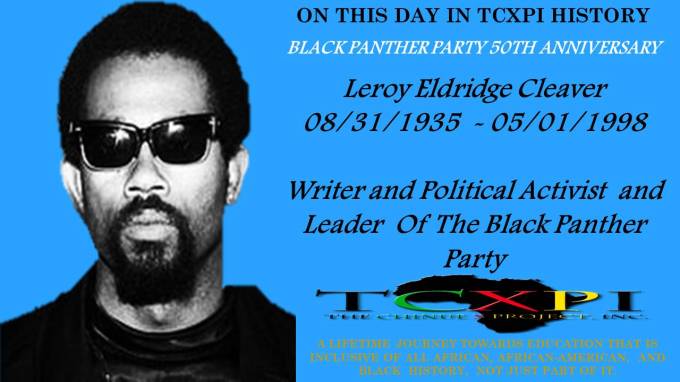
On This Day In TCXPI History
(The Chinue X Project, Inc.) TCXPI Presents The Black Panther Party 50th Anniversary
October Is Black Panther Party Month! October 12
Leroy Eldridge Cleaver (August 31, 1935 – May 1, 1998) better known as Eldridge Cleaver, was a writer and political activist who became an early leader of the Black Panther Party. His book Soul On Ice is a collection of essays praised by The New York Times Book Review at the time of its publication as "brilliant and revealing."
Cleaver went on to become a prominent member of the Black Panthers, having the titles Minister of Information, and Head of the International Section of the Panthers while in exile in Cuba and Algeria. As editor of the official Panther's newspaper, Cleaver's influence on the direction of the Party was rivaled only by founders Huey P. Newton and Bobby Seale. Cleaver and Newton eventually fell out with each other, resulting in a split that weakened the Party.
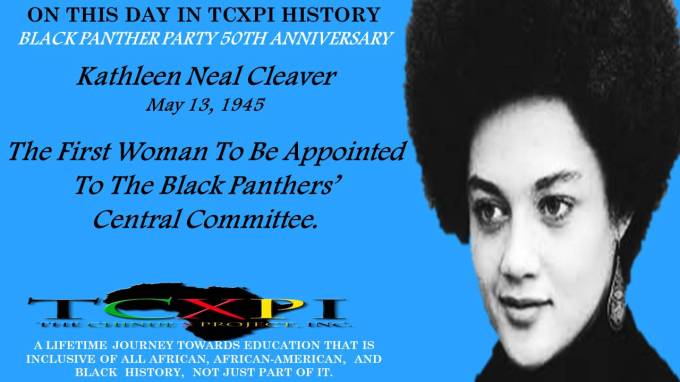
On This Day In TCXPI History
(The Chinue X Project, Inc.) TCXPI Presents The Black Panther Party 50th Anniversary
October Is Black Panther Party Month! October 13
Kathleen Neal was born in Dallas, Texas, on 13th May, 1945. Her father, Ernest Neal, taught sociology at Wiley College before moving to the Tuskegee Institute in Alabama. He later joined the Foreign Service and the family lived in India, Liberia, Sierra Leone and the Philippines.
Kathleen returned to the United States to finish her education. While studying at Barnard College she became involved in the civil rights movement. In 1967 she left college to work full-time for the Student Nonviolent Coordinating Committee (SNCC). The following year she met Eldridge Cleaver and moved from New York to San Francisco to join the Black Panther Party (BPP). The couple married on 27th December, 1967.
Kathleen Cleaver became the BPP's National Communications Secretary and helped to organize the campaign to get Huey Newton released from prison. She was also the first woman to be appointed to the Black Panthers Central Committee.
On 6th April, 1968 eight BPP members, including Eldridge Cleaver, Bobby Hutton and David Hilliard, were travelling in two cars when they were ambushed by the Oakland police. Cleaver and Hutton ran for cover and found themselves in a basement surrounded by police. The building was fired upon for over an hour. When a tear-gas canister was thrown into the basement the two men decided to surrender. Cleaver was wounded in the leg and so Hutton said he would go first. When he left the building with his hands in the air he was shot twelve times by the police and was killed instantly.
Cleaver was arrested and charged with attempted murder. He was given bail and in November, 1968, he fled to Mexico with Kathleen. Later the couple moved to Cuba. They also spent time in Algeria.
While in exile Cleaver had disagreements with Huey Newton and in 1971 he was expelled from the Black Panther Party. Soon afterwards Cleaver formed the Revolutionary Peole's Communication Network and Kathleen returned to the United States to establish the party in New York.
While living abroad Cleaver underwent a mystical conversion to Christianity. He now rejected his former political beliefs describing the system in Cuba as "voodoosocialism". He also wrote an article for the New York Times where he argued "With all its faults, the American political system is the freest and most democratic in the world."
Note - These pictures are assumed to be in the public domain, if this is not the case, please let us know by emailing us at thecxpi@gmail.com so that we can give credit or remove them from the web site as desired.
For More Daily Black History, visit: http://tcxpi.org/
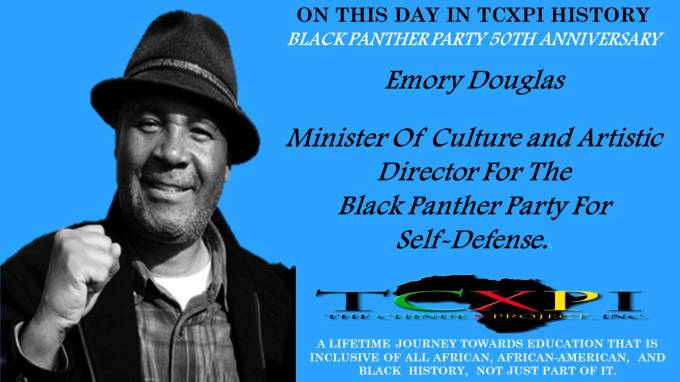
On This Day In TCXPI History
(The Chinue X Project, Inc.) TCXPI Presents The Black Panther Party 50th Anniversary
October Is Black Panther Party Month! October 14
Emory Douglas, Minister Of Culture and Artistic Director For The Black Panther Party For Self-Defense.
Emory Douglas was born in 1943 in Grand Rapids, Michigan, and has been a resident of the Bay Area since 1951. He became the Minister of Culture for the Black Panther Party in 1967, a role he held until the party disbanded in the early 1980s.
During the Party’s active years he served as the art director overseeing the design and layout of the Black Panther, the Party’s weekly newspaper.
Douglas was trained as a commercial artist at City College of San Francisco and has been the subject of several solo exhibitions. His work has also been in numerous exhibitions about the history of the Black Panther Party, including shows at the Arts & Culture Conference of the Black Panther Party in Atlanta, GA in 2008 and “The Black Panther Rank and File” at the Yerba Buena Center for the Arts, San Francisco in 2006. Most recently his work was the subject of a solo exhibition at Urbis, Manchester, UK in 2008-2009. In 2007, artist Sam Durant curated a solo exhibition of Douglas’ work at the MOCA Pacific Design Center in Los Angeles, “Black Panther: The Revolutionary Art of Emory Douglas,” which is the inspiration for the presentation at the New Museum. The same year, Rizzoli published a book with the same title that included essays and interviews about Douglas’s work and his relationship to the Black Panther Party. Douglas’s work has also been presented at the 2008 Biennale of Sydney, Australia; the African American Art & Cultural Complex, San Francisco; Richmond Art Center, CA; and the Station Museum of Contemporary Art, Houston.
For More Daily Black History, visit: http://tcxpi.org/
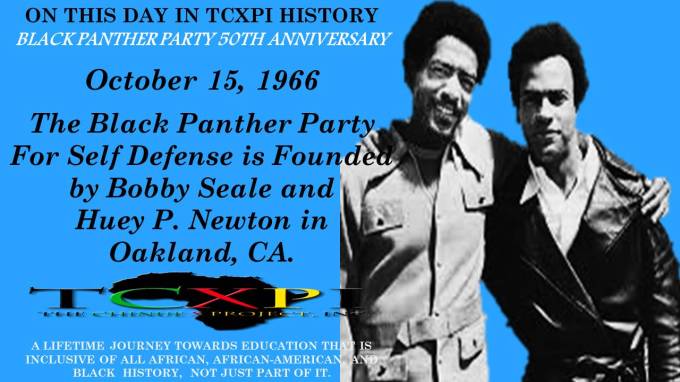
On This Day In TCXPI History
(The Chinue X Project, Inc.) TCXPI Presents The Black Panther Party 50th Anniversary
(The Chinue X Project, Inc.) TCXPI Presents The Black Panther Party 50th Anniversary
October Is Black Panther Party Month! October 15
Huey Newton and Bobby Seale founded the Black Panther Party for Self-Defense, in Oakland California, October 15, 1966.
The Black Panther Party practiced militant self-defense of minority communities against the U.S. government, and fought to establish revolutionary socialism through mass organizing and community based programs.
The party was one of the first organizations in U.S. history to militantly struggle for ethnic minority and working class emancipation — a party whose agenda was the revolutionary establishment of real economic, social, and political equality across gender and color lines.
Black Panther Theory: The practices of the late Malcolm X were deeply rooted in the theoretical foundations of the Black Panther Party. Malcolm had represented both a militant revolutionary, with the dignity and self-respect to stand up and fight to win equality for all oppressed minorities; while also being an outstanding role model, someone who sought to bring about positive social services; something the Black Panthers would take to new heights.
The BPP of Self-Defense followed Malcolm's belief of international working class unity across the spectrum of color and gender, and thus united with various minority and white revolutionary groups. From the tenets of Maoism they set the role of their Party as the vanguard of the revolution and worked to establish a united front, while from Marxism they addressed the capitalist economic system, embraced the theory of dialectical materialism, and represented the need for all workers to forcefully take over the means of production.
Black Panther History: On April 25th, 1967, the first issue of The Black Panther, the party's official news organ, goes into distribution. In the following month, the party marches on the California state capital fully armed, in protest of the state's attempt to outlaw carrying loaded weapons in public. Bobby Seale reads a statement of protest; while the police respond by immediately arresting him and all 30 armed Panthers. This early act of political repression kindles the fires to the burning resistance movement in the United States; soon initiating minority workers to take up arms and form new Panther chapters outside the state.
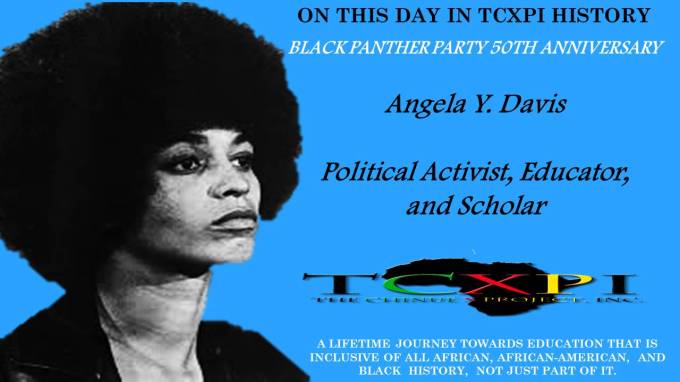
On This Day In TCXPI History
(The Chinue X Project, Inc.) TCXPI Presents The Black Panther Party 50th Anniversary
October Is Black Panther Party Month! October 16
Angela Davis, Political Activist, Educator, and Scholar, was born on January 26, 1944, in the “Dynamite Hill” area of Birmingham, Alabama. The area received that name because so many African American homes in this middle class neighborhood had been bombed over the years by the Ku Klux Klan. Her father, Frank Davis, was a service station owner and her mother, Sallye Davis, was an elementary school teacher. Davis’s mother was also active in the National Association for the Advancement of Colored People (NAACP), when it was dangerous to be openly associated with the organization because of its civil rights activities. As a teenager Davis moved to New York City with her mother, who was pursuing a Master’s degree at New York University. While there she attended Elizabeth Irwin High School, a school considered leftist because a number of its teachers were blacklisted during the McCarthy era for their earlier alleged Communist activities.
In 1961 Davis enrolled in Brandeis University in Waltham, Massachusetts. While at Brandeis, Davis also studied abroad for a year in France and returned to the U.S. to complete her studies, joining Phi Beta Kappa and earning her B.A. (magna cum laude) in 1965. Even before her graduation, Davis, so moved by the deaths of the four girls killed in the bombing of Sixteenth Street Baptist Church in her hometown in 1963, that she decided to join the civil rights movement. By 1967, however, Davis was influenced by Black Power advocates and joined the Student Nonviolent Coordinating Committee (SNCC) and then the Black Panther Party. She also continued her education, earning an M.A. from the University of California at San Diego in 1968. Davis moved further to the left in the same year when she became a member of the American Communist Party.
In 1969 Angela Davis was hired by the University of California at Los Angeles (UCLA) as an assistant professor of philosophy, but her involvement in the Communist Party led to her dismissal. During the early 1970s she also became active in the movement to improve prison conditions for inmates. That work led to her campaign to release the “Soledad (Prison) Brothers." The Soledad Brothers were two African American prisoners and Black Panther Party members, George Jackson and W. L. Nolen, who were incarcerated in the late 1960s.
On August 7, 1970, Jonathan Jackson, the younger brother of George Jackson, attempted to free prisoners who were on trial in the Marin County Courthouse. During this failed attempt, Superior Court Judge Harold Haley and three others including Jonathan Jackson were killed. Although Davis did not participate in the actual break-out attempt, she became a suspect when it was discovered that the guns used by Jackson were registered in her name. Davis fled to avoid arrest and was placed on the FBI’s most wanted list. Law enforcement captured her several months later in New York. During her high profile trial in 1972, Davis was acquitted on all charges.
The incident nonetheless generated an outcry against Davis and then California Governor Ronald Reagan campaigned to prevent her from teaching in the California State university system. Despite the governor’s objection, Davis became a lecturer in women’s and ethnic studies at San Francisco State University in 1977.
As a scholar, Davis has authored five books, including Angela Davis: An Autobiography in 1974; Women, Race, and Class in 1983; and Blues Legacies and Black Feminism: Gertrude “Ma” Rainey, Bessie Smith, and Billie Holiday in 1999.
Posted by
The Chinue X Project, Inc, An Afrocentric Educational Resource Service TCXPI AERS
at
4:17 PM
1 comments

Subscribe to:
Comments (Atom)






































